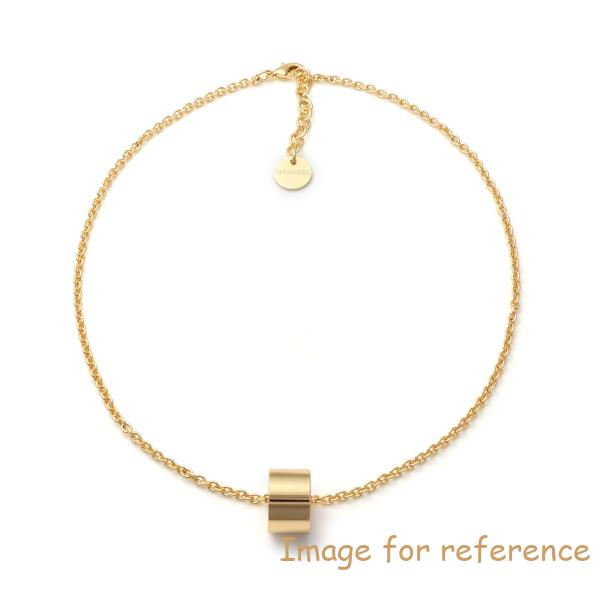Choosing the Optimal Base Metal for Custom 18K Gold Vermeil Waist Chains: Copper vs. 925 Sterling Silver
Abstract
The selection of base metals for custom 18K gold vermeil waist chains significantly influences the piece’s durability, aesthetic appeal, hypoallergenic properties, and overall value. This comprehensive analysis examines the advantages and limitations of using copper and 925 sterling silver as base metals for such jewelry, offering insights to guide informed decision-making in jewelry design and production.

1. Introduction
Waist chains, often referred to as belly chains, have transcended traditional cultural attire to become mainstream fashion accessories. When designing custom 18K gold vermeil waist chains, the choice of base metal is pivotal. This article delves into the characteristics of copper and 925 sterling silver, evaluating their suitability as base metals for gold vermeil waist chains.
2. Understanding Gold Vermeil
Gold vermeil is a high-quality gold-plated jewelry that adheres to specific standards:
-
Base Metal: Must be sterling silver (92.5% pure silver)
-
Gold Purity: At least 10K gold
-
Gold Layer Thickness: A minimum of 2.5 micronsluksonjewels+6TheCustomGoodsCo+6维基百科+6Justine Jewellery+4MOSUO+4GQ+4
These standards ensure that gold vermeil pieces offer durability and a high-quality finish, providing an affordable alternative to solid gold jewelry. GQ
3. Copper as a Base Metal
3.1 Composition and Characteristics
Copper is a reddish-brown metal known for its malleability and conductivity. It is often alloyed with other metals to enhance its properties.
3.2 Advantages
-
Cost-Effectiveness: Copper is less expensive than sterling silver, reducing production costs.
-
Workability: Its softness allows for intricate designs and easy manipulation.
3.3 Limitations
-
Tarnishing: Copper tarnishes over time, developing a greenish patina that may not be desirable in jewelry.
-
Hypoallergenic Concerns: Some individuals may experience skin reactions to copper, leading to irritation.
-
Durability: Copper is softer than sterling silver, making it more prone to scratches and dents.JIMMY JEWELLRY+1Allure+1
4. 925 Sterling Silver as a Base Metal
4.1 Composition and Characteristics
Sterling silver is an alloy composed of 92.5% pure silver and 7.5% other metals, usually copper. This composition provides strength and durability to the metal. Southern Living+4维基百科+4TheCustomGoodsCo+4TheCustomGoodsCo+1luksonjewels+1
4.2 Advantages
-
Durability: Sterling silver is more durable than copper, resisting scratches and dents.
-
Hypoallergenic Properties: It is generally considered safe for individuals with sensitive skin.
-
Tarnish Resistance: While sterling silver can tarnish, it is less prone to corrosion compared to copper.
-
Aesthetic Appeal: Sterling silver provides a bright, white, and lustrous finish that complements the gold vermeil layer.Byrdie+3JIMMY JEWELLRY+3Justine Jewellery+3
4.3 Limitations
-
Cost: Sterling silver is more expensive than copper, increasing production costs.
-
Tarnishing: Sterling silver can tarnish over time due to exposure to air and moisture.
5. Comparative Analysis
| Feature | Copper | 925 Sterling Silver |
|---|---|---|
| Cost | Lower | Higher |
| Durability | Less durable | More durable |
| Hypoallergenic | Potential for irritation | Generally hypoallergenic |
| Tarnish Resistance | Prone to tarnishing | Tarnishes over time |
| Aesthetic Appeal | Warm, reddish hue | Bright, white, lustrous finish |
This comparison highlights that while copper offers cost savings, 925 sterling silver provides superior durability, hypoallergenic properties, and a more desirable aesthetic finish for gold vermeil waist chains.
6. Conclusion
For custom 18K gold vermeil waist chains, 925 sterling silver is the preferred base metal due to its durability, hypoallergenic properties, and compatibility with the gold vermeil layer. While copper may offer initial cost savings, its limitations in terms of durability and potential skin reactions make it less suitable for high-quality jewelry pieces.
References
-
GQ. (2023). What Is Gold Vermeil, and How Much Money Can It Save You? Retrieved from https://www.gq.com/story/gold-vermeil-jewelry
-
Wikipedia. (2023). Sterling Silver. Retrieved from https://en.wikipedia.org/wiki/Sterling_silver
-
Southern Living. (2018). Does Sterling Silver Tarnish? What You Need to Know. Retrieved from https://www.southernliving.com/home/cleaning-and-housekeeping/does-sterling-silver-tarnish维基百科Southern Living
